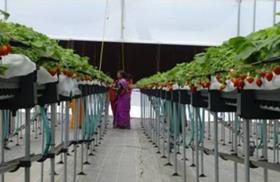
Japanese technology is being introduced in the Indian region of Pune to improve the production of strawberries, according to press reports in the country.
As reported in the Financial Express, a group called Japanese International Cooperation Agency (JICA) has teamed up with information technology giant NEC to help growers install IT-based sensors that monitor pH, temperature and moisture during cultivation.
At the same time, supported by expert advice from technicians back in Japan, the growers are said to be benefiting from new cloud-based storage systems that are employed to track data relating to the growing process.
Demand for the technology has risen among Indian strawberry growers trying to cope with changing weather conditions, increasingly expensive labour rates and an influx of cheaper imported fruit, the newspaper reported.
Unlike indoor systems more commonly seen in major berry-producing countries such as the Netherlands and the United States, the Japanese solution – which was created in response to skyrocketing electricity prices – is considered to be more suited to the high temperatures and humidity found in Pune.
Shankar Jadhav, executive director of the Institute of Cultural Affairs, told the newspaper that the first harvest using the sensors and cloud-based system had been successful.
Last season, in a half-acre greenhouse, about 15,000 Japanese strawberry plants reportedly yielded more than 22 tonnes of fruit, and now 45,000 plants are being grown.
“At present, the yield is around 300g per plant,” he explained. “Profits will start coming when the yield touches 500g per plant which is being attempted by growing plants in a three-tier system so that the harvest can be tripled.”
“Costs are high at Rs70 lakh per hectare,” he added. “However, if a group of farmers could set up a greenhouse and if the government can provide subsidy to the farmers, it could be feasible. We are also in the process of inviting some investors to provide the capital while farmers provide the land.”






No comments yet